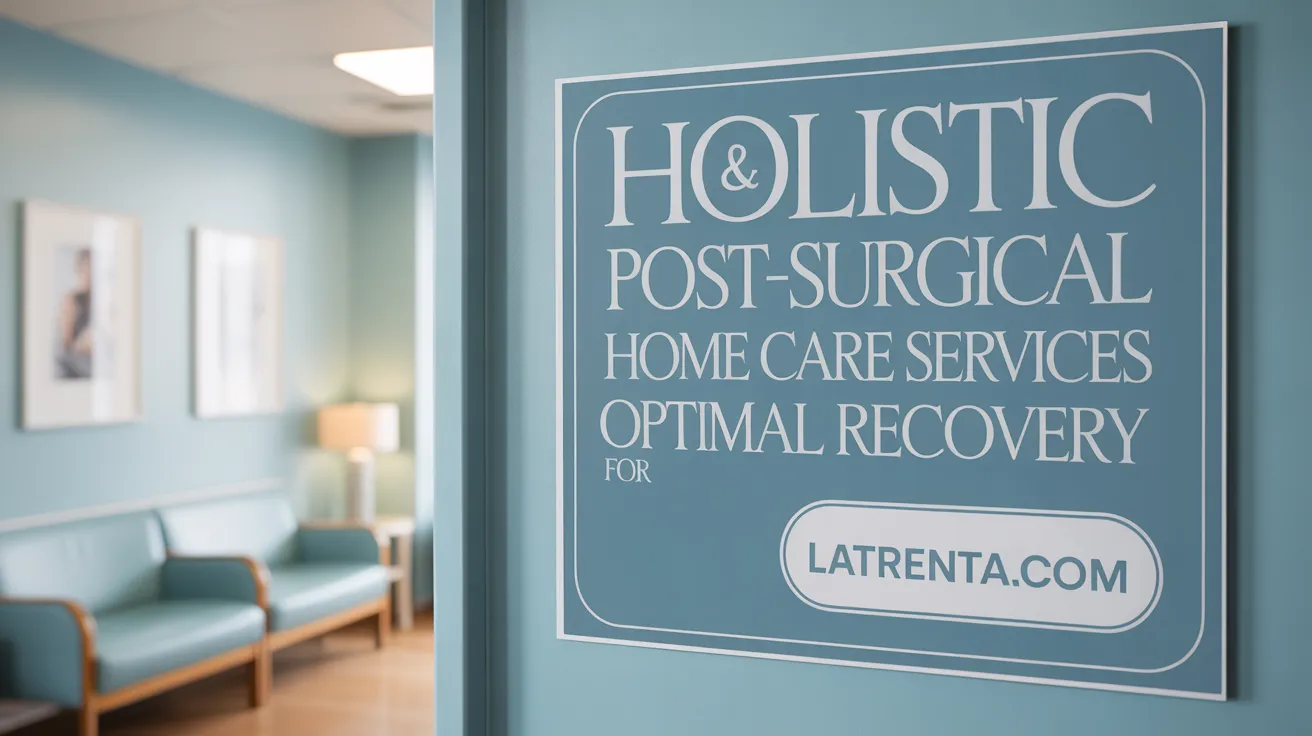Introducing Concierge-Level Care in Surgery
In the evolving landscape of healthcare, concierge-level care is transforming how patients experience surgery. By providing individualized attention before, during, and after surgical procedures, this model enhances comfort, outcomes, and patient satisfaction. This narrative explores the essence of concierge healthcare services tailored to surgical journeys, detailing their unique benefits, key differences from traditional care, and holistic patient support strategies.
Understanding Concierge-Level Healthcare Services Throughout Surgery
What are concierge-level healthcare services and how do they operate before, during, and after surgery?
Concierge-level healthcare services are highly personalized medical care options that focus on providing patients with seamless, accessible, and comprehensive support throughout their entire surgical journey. These services go beyond traditional care by emphasizing individualized attention, privacy, and convenience.
Before surgery, concierge providers often assist in detailed preoperative assessments, creating tailored treatment plans, and preparing the patient’s environment for recovery. They leverage digital technologies such as telehealth consultations, secure online communication platforms, and automated reminders to keep patients informed and engaged.
During the operation, although direct involvement is managed by the surgical team, concierge services coordinate care seamlessly. They ensure that all necessary support and resources are ready, minimizing patient stress and facilitating smooth interactions with the medical team.
After surgery, concierge healthcare continues with personalized home care, focusing on wound management, medication monitoring, mobility assistance, and emotional support. Multidisciplinary teams—including nurses, physical therapists, and case managers—work together to monitor recovery, address complications early, and promote comfort.
This model relies heavily on strong patient-provider relationships, offering longer and more personalized consultations, 24/7 access to healthcare professionals, and proactive communication. This approach not only enhances patient satisfaction but also supports better recovery outcomes by reducing stress, improving adherence to care plans, and allowing for prompt intervention when needed.
Overall, concierge healthcare for surgery ensures a smooth, patient-centered experience that emphasizes quality, convenience, and holistic care throughout all phases of the surgical process.
Benefits of Personalized Concierge Care in Surgical Contexts
What are the benefits of personalized concierge-level patient care in the surgical context?
Personalized concierge care transforms the surgical recovery experience by offering extensive benefits that focus on individual patient needs. One significant advantage is enhanced communication and access to healthcare providers. Patients often enjoy longer, more detailed consultations and around-the-clock availability, which builds trust and ensures immediate attention to concerns.
Custom treatment planning is another core benefit. Concierge providers tailor recovery plans that address specific surgical procedures and patient lifestyles. This approach allows for proactive health management, including preventive strategies to minimize complications.
Holistic therapies and luxury amenities also play a vital role in recovery. Many concierge services include options like massages, nutritional support, or access to specialists, making the healing process more comfortable and personalized.
Improved adherence to postoperative care instructions is common among patients engaged in concierge programs. Better understanding and regular follow-up foster higher compliance, leading to fewer complications.
Ultimately, this comprehensive and attentive care model promotes better clinical outcomes. The close relationship between patients and providers ensures seamless coordination and continuity, encouraging quicker recoveries and higher satisfaction. As a result, individuals experience not just medical healing but an overall sense of support and well-being during their surgical journey.
Contrasting Concierge Care with Traditional Healthcare Models

How does concierge care differ from traditional healthcare models?
Concierge health services stand apart from conventional healthcare primarily in their approach to patient care and accessibility. Traditional healthcare typically operates on a fee-for-service basis, where large patient panels and shorter appointment times limit personalized interaction. Patients often see their doctor only during scheduled visits, and access to healthcare providers can be limited, especially in urgent situations.
In contrast, concierge care is a membership-based model that emphasizes proactive, personalized attention. Patients usually pay an annual fee, which grants them longer appointments, immediate access through direct communication channels, and comprehensive management of chronic conditions or recovery. This model ensures that each patient receives tailored care plans, addressing specific health needs and goals.
A significant difference lies in the size of the practice. Concierge practices maintain small patient panels, allowing providers to dedicate more time and resources to each individual. This setup facilitates better monitoring, emotional support, and coordination with other healthcare professionals.
While traditional healthcare relies heavily on insurance, often limiting coverage to basic services, concierge services can be partially covered by insurance but often involve out-of-pocket costs. They frequently include 24/7 availability, home visits, and luxury amenities, providing convenience and comfort that go beyond standard care.
Overall, concierge medicine aims to enhance patient satisfaction, improve health outcomes, and reduce the stress associated with medical care by offering highly personalized, accessible, and comprehensive services—an approach that sharply contrasts with the broader, volume-centric model of traditional healthcare.
Comprehensive Services in Concierge Post-Surgical and Home Care

What types of services are typically offered within concierge post-surgical care, including nursing and home care options?
Concierge post-surgical care provides a wide array of personalized services designed to support patients during recovery. Registered nurses (RNs) and licensed practical nurses (LPNs) deliver clinical care directly in the patient’s home or chosen setting. This includes wound care, where strict sterile techniques are used to prevent infection and promote healing. Managing medications and monitoring for signs of complications are also essential components of care plans.
In addition to medical attention, services extend to assistance with daily routines such as errands, meal preparation, and light housekeeping. These help create a comfortable environment, reduce stress, and enable patients to focus on recovery. Many providers have specialized skills tailored to specific surgeries like orthopedic, cardiac, neurosurgical, or oncology procedures, as well as chronic disease management.
Beyond clinical tasks, concierge caregivers offer companionship and emotional support, helping with mobility, reassurance, and morale. This holistic approach ensures physical health and emotional well-being are both addressed. Care plans can be customized to include additional services such as nurse escort for hospital transfers, respite care for families, and comprehensive health support, all performed by vetted healthcare professionals committed to a seamless, effective healing process.
Cost Considerations and Insurance Coverage in Concierge Medical Services
What are the cost considerations and insurance coverage aspects related to concierge medical services?
Concierge medical services generally require patients to pay an annual or monthly membership fee or retainer. This fee covers personalized, private healthcare access and is paid directly by the patient, often out-of-pocket, and is typically not reimbursed by insurance. These fees can vary widely, but most fall within the range of $3,000 to $6,000 per year.
While the membership fee itself usually isn't covered, many concierge practices accept insurance for routine services such as physical exams, lab work, preventive screenings, and minor procedures. These services are billed similarly to traditional primary care and can often be reimbursed through private insurance plans, Medicare, VA benefits, or Tricare.
Patients can also utilize Health Savings Accounts (HSAs) or Flexible Spending Accounts (FSAs) to pay for reimbursable medical services, effectively reducing out-of-pocket expenses. It's important for individuals to check with their insurance providers beforehand to clarify what services are covered and how billing is handled.
For more extensive medical needs, such as surgeries or emergency interventions, patients typically rely on their insurance plans to cover the costs, while the concierge service’s membership or retainer fee remains an independent expense. This combination allows patients to access both personalized ongoing care and coverage for more significant medical procedures.
In summary, while concierge medicine offers tailored, round-the-clock care, the additional costs and coverage options should be carefully reviewed to determine affordability and plan for expenses accordingly.
| Cost Aspect | Description | Additional Details |
|---|---|---|
| Membership Fees | Annual or monthly retainer paid directly by patients | Usually $3,000 - $6,000 annually |
| Insurance Reimbursable Services | Routine preventive care, tests, minor procedures | Billed similar to traditional care |
| Use of HSAs and FSAs | Can be used to pay for reimbursable services | Tax-advantaged savings accounts |
| Out-of-Pocket Expenses | For surgeries, emergencies, and services outside retainer | Depends on insurance coverage |
More research can be done by searching "Concierge medicine costs and insurance coverage" to explore current options and trends.
Preparing for Surgery with Concierge-Level Care: Tips and Best Practices

How can patients effectively prepare for surgery when receiving concierge-level care?
Patients planning to undergo surgery with concierge services should begin by working closely with their dedicated healthcare team to create a tailored preoperative plan. This includes completing all necessary tests, reviewing medications, and stopping certain drugs two weeks beforehand if advised. Personalized plans help ensure safety and optimize outcomes.
Utilizing digital tools offered by concierge programs, such as telehealth consultations, online forms, and direct messaging, keeps patients informed and engaged. These resources allow real-time communication, quick question resolution, and continuous monitoring, making the preparation process more comfortable.
Home safety is a vital consideration. Patients should prepare their environment by cleaning, organizing daily essentials, and installing safety devices like grab bars or nonslip mats. Stocking up on essential supplies such as pain relievers, wound care products, and comfort items supports smoother recovery, especially during the first few days post-surgery.
Coordination with concierge home care providers can make a significant difference. These professionals assist with wound management, medication adherence, and daily activities, providing personalized support that promotes healing and comfort.
Clear communication about post-surgery needs and available support services is essential. Sharing concerns and expectations with healthcare providers ensures a seamless experience, reduces anxiety, and enhances recovery. Proper planning and professional assistance set the foundation for a successful surgical journey, emphasizing safety, comfort, and high-quality personalized care.
The Role of Personalized Attention in Enhancing Surgical Recovery

How does personalized attention in concierge care enhance recovery outcomes after surgery?
Personalized attention from concierge nursing services significantly boosts recovery outcomes by focusing on the unique needs of each patient. This tailored approach begins with preoperative education, where patients receive customized information about their procedure, expected recovery process, and specific care protocols. Such preparation helps reduce anxiety and eases psychological stress, which are common barriers to smooth recovery.
During the postoperative phase, concierge nurses closely monitor vital signs, manage medications, and provide wound care tailored to the individual’s condition. This ongoing attention ensures early detection of potential complications, enabling prompt interventions that prevent more serious issues. Pain management strategies are customized based on individual responses, often incorporating multimodal therapies—such as advanced monitoring, IV therapies, and alternative pain relief methods—that result in reduced pain levels and lower opioid reliance.
Patients under concierge care generally report higher satisfaction levels due to the private, attentive environment and direct communication with healthcare providers. This sense of reassurance and confidence enhances emotional well-being, which is crucial for successful recovery.
In practical terms, personalized attention translates into shorter hospital stays, faster return to daily activities, and improved overall health outcomes. The holistic, patient-centered approach fosters a more efficient and satisfying recovery journey, demonstrating that individualized care plays a pivotal role in achieving optimal surgical results.
What Patients Experience: Concierge-Style Preoperative to Postoperative Care

What can patients expect regarding their experience with concierge-style preoperative, intraoperative, and postoperative care?
Patients who choose concierge healthcare models often encounter a highly individualized and attentive approach to surgical care. From the initial consultation, they benefit from longer, unhurried discussions where their concerns, medical history, and personal goals are thoroughly explored.
One of the main advantages is immediate and direct access to their healthcare team, including physicians and nurses, through secure digital communication channels. This allows for prompt responses to questions, appointment scheduling, and ongoing support without delays common in traditional care settings.
Seamless coordination is facilitated by digital tools such as telehealth platforms, electronic health records, and online planning, ensuring that every phase of the surgical process is well-organized. Patients can easily access preoperative instructions, medication management plans, and follow-up care details.
The care approach is holistic—addressing not just the physical aspects of surgery, but also mental health and lifestyle considerations. This comprehensive support helps reduce anxiety, manage pain effectively, and promote faster recovery.
Overall, patients experience less stress, greater involvement in their health decisions, and improved recovery outcomes. Concierge-style care transforms the surgical journey into a personalized, efficient, and supportive process, heightening overall satisfaction and health results.
The Future of Personalized Surgical Care
Concierge-level care is reshaping the surgical experience by offering deeply personalized, comprehensive support tailored to each patient’s unique journey. From meticulous preoperative planning and seamless intraoperative coordination to attentive postoperative recovery and home-based nursing services, this model prioritizes patient comfort, safety, and optimal health outcomes. While cost and access considerations remain, the benefits of enhanced communication, emotional support, and individualized attention make concierge care a compelling choice for patients seeking a superior surgical journey. As healthcare evolves, concierge-level services will likely play a pivotal role in setting new standards for patient-centered surgical care, ultimately promoting faster recovery and higher satisfaction.
References
- Concierge Home Care for Post-Surgery Recovery
- What is Concierge Nursing? Complete Guide to ...
- What is Concierge Nursing?
- Concierge Home Care for Post-Surgery Recovery
- The Concierge Approach to Orthopedic Surgery
- Redefining Healthcare Accessibility with 24/7 Concierge ...
- What Is Concierge Medicine? Personalized Healthcare ...
- Traditional vs. Concierge Health Models: A Comparative ...
- A literature review on the impact of concierge medicine ...
- Traditional Primary Care v.s. Concierge Care
